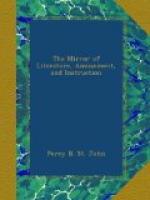* * * * *
REVIEWING.
There are three ways of reviewing a book. First, to take no more notice of it, or of its author, than if neither the one nor the other had ever been produced—cautiously to avoid the most distant allusions to their names, characters, or professions, thereby avoiding all personality, in their case at least, all intrusion, either into public or private life. Secondly, to select all the good passages, and to comment upon them with such power and vivacity, that beside your pearls they seem paste. Thirdly, to select all the best passages, and to string them all together on a very slight thread—like dew-drops on gossamer—and boldly palm it upon the public as an original article.—Blackwood’s Mag.
* * * * *
MOTTOES FOR SUN DIALS.
By the Rev. W. Lisle Bowles.
MORNING
SUN.—Tempus volat.
OH! early passenger, look up—be
wise,
And think how, night and day, TIME ONWARD
FLIES.
NOON.—Dum tempus habemus,
operemur bonum.
Life steals away—this hour,
oh man, is lent thee,
Patient to “WORK THE WORK OF HIM
WHO SENT
THEE.”
SETTING
SUN.—Redibo, tu nunquam.
Haste, traveller, the sun is sinking now—
He shall return again—but never
thou.
* * * * *
THE PINE-APPLE.
Oviedo extols the pine-apple above all the fruits which grew in the famous gardens of his time, and above all that he had tasted in his travels in Spain, France, England, Germany, the whole of Italy, Sicily, the Tyrol, and the whole of the Low Countries. “No fruit,” says he, “have I known or seen in all these parts, nor do I think that in the world there is one better than it, or equal to it, in all those points which I shall now mention, and which are, beauty of appearance, sweetness of smell, taste of excellent savour; so that there being three senses out of the five which can be gratified by fruit, such is its excellence above all other fruits or dainties in the world, that it gratifies those three, and even the fourth also; to wit the touch. As for the fifth, that is to say, the hearing, fruit, indeed, can neither hear nor listen, but in its place the reader may hear and attend to what is said of this fruit, and he will perceive that I do not deceive myself in what I shall say of it. For albeit fruit can as little be said to possess any of the other four senses, in relation to the which I have, as above, spoken, of these I am to be understood in the exercise and person of him who eats, not of the fruit itself, which hath no life, save the vegetative one, and wants both the sensitive and rational, all three of which exist in man. And he, looking at these pines, and smelling to them, and tasting them, and feeling them, will justly, considering these four parts or particularities, attribute to it the principality above all other fruits.”




